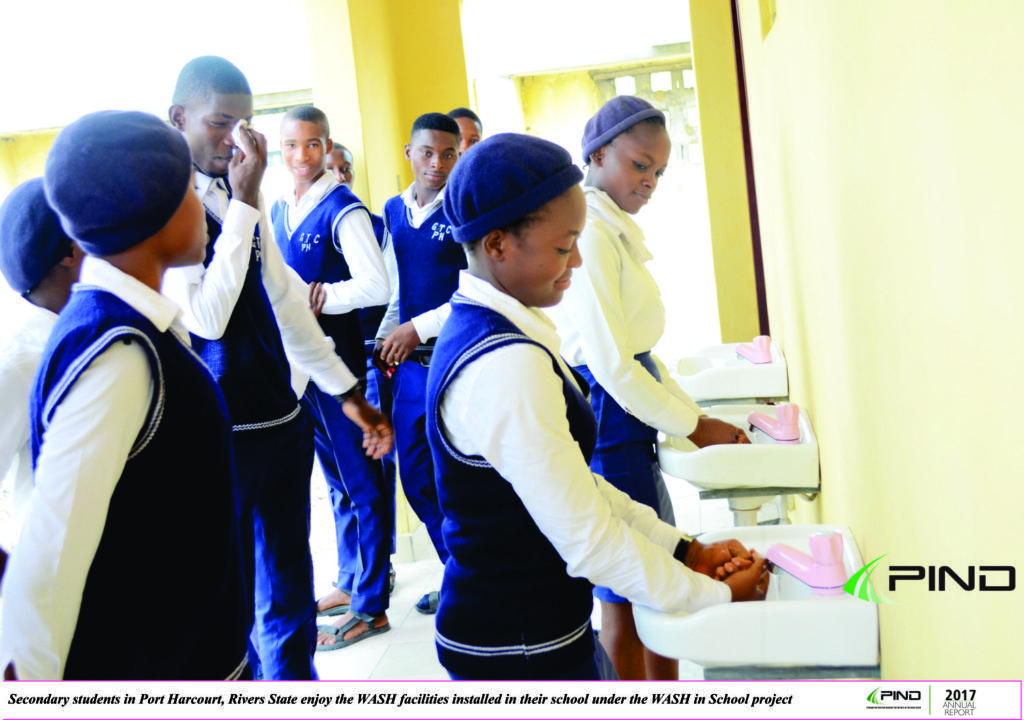
Access to safe and clean water resources and good water management practices are huge issues in the Niger Delta that contribute to a high rate of water-borne diseases b with its attendant health and economic impacts. PIND recognizes that better WASH practices and facilities would help reduce the disease burden and ultimately improve productivity in the region. And we worked to trigger investments for these in 2017.
Delivering Effective WASH (DEWT) Trainers Increased Demand for WASH training: WASH education requires skilled trainers. We had signed a Program Cooperation Agreement (PCA) with the United Nations Children’s Fund (UNICEF) to enhance peacebuilding in 10 Local Government Areas (LGAs) in five Niger Delta states by developing systems to mainstream conflict sensitivity in WASH programming and build the capacities of local institutions to use these systems to strengthen social bonding and mitigate conflict in project communities.
This year, under the partnership, PIND worked with the Centre for Affordable Water and Sanitation Technology (CAWST) to complete the development of a national Water Sanitation and Hygiene (WASH) training manual with sets of modules termed Delivering Effective WASH Training (DEWT) to empower practitioners with an understanding of the fundamentals of the WASH sector, in addition to a Community Water Safety Planning (CWSP) manual.
Through the partnership, we produced over 100 WASH trainers (insert gender) with deep understanding of the core principles of planning, designing and implementing activities to improve sustainable and equitable access to domestic water supply and sanitation facilities and improve hygiene behaviors.
The availability of the manual and these skilled trainers triggered an increase in the number of agencies/organizations demanding for and attending the PIND customized DEWT training delivered by these WASH expert service providers, including the National Water Resources Institute, Federal Ministry of Water Resources, United Purpose, Action Against Hunger, and Save the Children. These government and private organizations invested N26 million in WASH capacity building in 2017.
PIND has positioned itself as a major hub for building capacity to manage change in the WASH sector.
Water, Sanitation and Hygiene (WASH) Infrastructure and Student-Champions in Schools: Facilities for WASH are important to sustain good practices. The Water, Sanitation and Hygiene in Schools (WinS) project, a collaboration between four partners – Procter & Gamble (P&G), Water and Sanitation Rotarian Action Group (WASRAG), H2O for Life, Rotary Clubs of Districts 9141 and 9142, and PIND acts at this nexus of facilities development and behavioral change to bring safe drinking water, proper sanitation, and hygiene education to 30 schools in the Niger Delta.

By the end of 2017, the partnership installed or upgraded sustainable WASH facilities inclusive of water boreholes and storage, toilets and handwashing stations in 14 schools across Bayelsa, Delta and Rivers States.
In order to guarantee sustained functionality of the WASH facilities in the schools, the partnership also set up student-run Schools’ Environmental Health Clubs (SEHCs) in eight (8) of the benefitting schools. Through these Clubs, the children gain awareness on better hygiene practices and become change agents championing proper hygiene and sanitation practices in their schools. The WASH Clubs also represent the interests of students on the School-Based Management Committees (SBMC) that makes financial decisions to support the operation and maintenance of the installed facilities. 25 school principals and teachers (insert gender) were trained on hygiene promotion to serve as mentors to the student members of the Schools’ Environmental Health Clubs.
DOWNLOAD REPORT HERE PIND 2017 Annual Report (4249 downloads )



